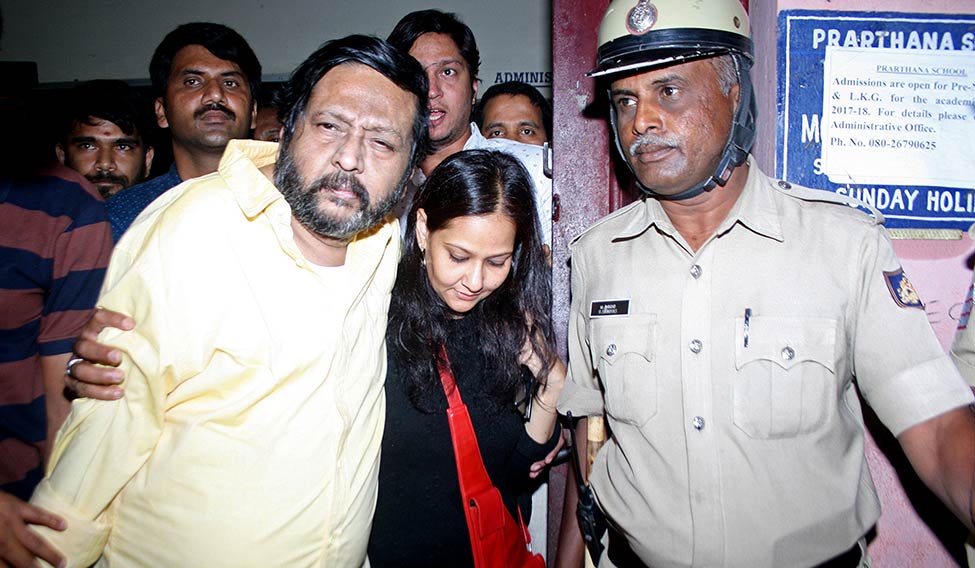Nearly a quarter century ago, a young man from Bellary landed in Bangalore with 0380 in his pocket. His rise was sensational, much like the reports he published in a weekly tabloid he founded after his arrival. The tabloid, Hai Bangalore, became so popular that 22 years after his arrival, Ravi Belagere owned two bungalows in the city, a book and coffee shop, farmhouses in Joida and Chikmagalur, and a fleet of expensive cars.
Belagere was the undisputed king of tabloid journalism in Karnataka, until the Central Crime Branch of the Karnataka Police arrested him on December 8, on charges of conspiring to kill a colleague. The CCB said Belagere had hired a contract killer in August to eliminate Sunil Heggaravalli, the tabloid’s chief crime reporter, whom he thought was having an affair with his second wife, Yashomati.
The police apparently stumbled upon the conspiracy while investigating the case related to the murder of journalist Gauri Lankesh, who was shot dead by unknown assailants on September 5. Investigators had been rounding up sharpshooters, and on December 3, they arrested one Tahir Hussain, alias Anoop Gowda, for his alleged links with an arms racket. Tahir led the police to Shashidhar Mundewadi, a 38-year-old hired gun who is said to have confessed that Belagere gave him supari to kill Heggaravalli.
The CCB said it was yet to ascertain Belagere’s motive and whether he had paid Mundewadi. Both Heggaravalli and Yashomati, who used to run Hai Bangalore in Belagere’s absence because of ill health, have apparently told investigators that he disliked seeing them talking to each other. Belagere has denied the charges. On December 13, he was granted interim bail on medical grounds.
As the editor of Hai Bangalore, Belagere has had a colourful and controversial career. His stories about crimes and the secret lives of the rich and powerful have won him plaudits and brickbats in equal measure. On June 21, the Karnataka assembly passed a resolution sentencing Belagere and another journalist (Anil Raju of Yelahanka Voice) to a year in jail for publishing reports that “defamed” three legislators. But, for reasons best known to the police, Belagere was not arrested.
With his arrest, rumours about Belagere’s personal life abound. He has two wives (he married Yashomati, a colleague, without divorcing his first wife, Lalita) and four children—two daughters and a son from his first marriage, and a son from his second.
After his arrest, he announced that he was planning to close down Hai Bangalore. “It is better to shut shop when the shop is doing well,” wrote Belagere in his column Khaas Baat. “I want to spend time reading books, listening to music…. I have penned 89 books and have been a trendsetter in Kannada journalism. Now, I want to give my readers more; and for that, I need to dedicate more time for writing.”
Hai Bangalore’s impending closure comes at a time when its erstwhile competitor, Lankesh Patrike, is struggling to stay afloat, and another, Gauri Lankesh Patrike, has stopped operations altogether.
Once the state’s bestselling weekly tabloids with a circulation of 1.9 lakh copies, Lankesh Patrike is now nowhere in the race. It was launched by the writer-filmmaker P. Lankesh on July 6, 1980, after a popular Kannada daily abruptly stopped publishing his column satirising politics, called ‘Indira Kripa Poshita Nataka Mandali (a drama troupe patronised by Indira Gandhi)’.
Lankesh was a shrewd businessman. He banked on stories targeting Congress leaders to drive up his tabloid’s circulation, and eschewed advertisements. His ad-free model became a trendsetter. “Lankesh Patrike chased stories that the mainstream media feared to publish,” recalled Ravindra Reshme, a former colleague of his. “Lankesh gained more confidence when a Tamil publisher offered to print his tabloid at half the normal cost. Dropping advertisements enhanced the paper’s credibility. Tough times ended, and the tabloid started ringing in profits, too—much to the relief of [Lankesh’s wife] Indira, who had started a sari business to meet family expenses.”
When Belagere landed in Bangalore, Lankesh Patrike was at its prime. In 2000, Lankesh died and his elder daughter, Gauri, who had been working as a journalist in Delhi, took over as editor. Five years later, though, she parted ways with Indrajith, her brother and the tabloid’s publisher, and launched Gauri Lankesh Patrike, with the tagline ‘ranjana, bodhane, prachodane [entertainment, enlightenment and provocation]’.
Gauri’s fiery activism set her paper apart from competitors. She successfully ran the ad-free tabloid for more than a decade—a normal issue had 16 pages and was priced at 015. At the time of her death, though, Gauri had been in deep financial crisis, with the tabloid’s circulation having plunged to around 10,000.
As the publisher of Lankesh Patrike, Indrajith, too, has been facing financial difficulties. The continual fall in circulation figures has meant that the ad-free model introduced by Lankesh is no longer sustainable. Before her death, Gauri herself had been planning to break away from the model by bringing out a special Diwali edition of Gauri Lankesh Patrike, replete with government ads. But her murder silenced her paper as well.
Belagere, however, has been swimming against the tide, and has done rather well for himself. The last time he voluntarily declared his assets—a practice he began years ago—he put his net worth at Rs 250 crore. He has debts of Rs 4 crore, and runs a school whose wage bills amount to Rs 2 crore annually. He also pays around Rs 50 lakh as income tax.
But it seems his case is just an exception. “The onslaught of television channels has stolen the charm of tabloids,” said Dinesh Amin Mattu, media adviser to the chief minister and Gauri’s friend. “Gauri had confided to me that her last insurance policy had matured, and that it was the last of her savings, too. She said, ‘If I have to continue the tabloid, I may have to sell my house and car’.”







